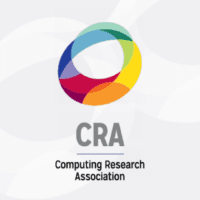Research Illustrates HOW Faculty Advisors are Critical to PhD Student Outcomes
By Dr. Kari George, University of Illinois Urbana-Champaign, and Dr. Kaitlin Newhouse, North Carolina State University
Motivated by persistent equity gaps in computing degree attainment, a recently published article from Drs. Kari George and Kaitlin Newhouse contributes new evidence to understand factors that may contribute to doctoral attrition or persistence. Most notably, this study elucidates how faculty advisors influence students’ experiences and educational outcomes.
Examination of Psychosocial Variables
The paper describes prior literature on theories of doctoral student progress, attrition, the importance of faculty advisors, and more recent research on psychosocial attributes. Using data from the 2018 CERP Graduate Data Buddies Survey, George and Newhouse proposed and tested a conceptual framework for understanding CS PhD student consideration of departure. Research has affirmed how educational experiences and interactions with others, especially faculty advisors, may influence students’ psychosocial attributes, and as a result, may mediate students’ persistence or attrition. Accordingly, this study tests the relationships between students’ satisfaction with their faculty advisor and their perceptions of the CS department, and their influence on relevant and disciplinary specific psychosocial attributes, including:
- Researcher self-efficacy – a measure of students’ confidence in various research activities (e.g., publishing, communicating with others in the field, becoming an expert)
- Computing identity – the extent to which students see themselves as a computer scientist
- Sense of belonging in computing – the extent to which students feel like they belong in
- computing
- Feeling disappointed in your accomplishments – the extent to which students felt they should have accomplished more relative to their expectations of themselves or to their perceptions of other students.
Findings
More than one-third (35%) of students considered leaving their doctoral programs, with significantly more women than men considering departure – a clear indication of the threats to broadening participation efforts. Findings elucidated the importance of psychosocial factors such as sense of belonging, researcher self-efficacy, perceptions of the departmental community, and the role of faculty advisors in reducing doctoral students’ consideration of departure. Specifically, students who rated their sense of belonging and researcher self-efficacy higher were significantly less likely to consider departure, with researcher self-efficacy having the strongest direct relationship to consideration of departure than any other variable. When students reported a greater degree of disappointment in their accomplishments, they were more likely to consider leaving. Important gender and racial/ethnic differences were also found, which shed light on challenges to BPC efforts.
Looking at the environments and interactions with others, findings indicated that more positive perceptions of the departmental community and greater satisfaction with their advisor reduced students’ thoughts of leaving and served as a protective factor with other variables. For instance, students who reported greater satisfaction with their advisor had a greater sense of community in the department, greater researcher self-efficacy, and decreased disappointments in their accomplishments – all of which reduced their consideration of departure.
This study illuminates how advisors play a role in student outcomes well before students actually decide to leave their programs. Positive relationships and satisfaction with their advisor are positively associated with students’ skills, engagement, and their self-perceptions. The research suggests advisors are important because the student-advisor relationship influences what students do, how students feel in the computing community, how students see themselves, and ultimately, whether or not they even think about leaving their programs.

Implications
The paper discusses several implications for policy and practice. Given the important findings about the role of faculty, it is imperative that departments and faculty focus on cultivating positive relationships with students and engage in quality advising and mentoring practices, such as those outlined in the Equity-Minded Mentorship toolkit. Departments should also intentionally foster a sense of community in the department and work toward meaningfully cultivating healthier research teams and cultures. By making intentional investments in the people and relationships across our computing departments, faculty and departmental leaders may work to address inequities in CS doctoral degree attainment.
Citation: George, K. L. & Newhouse, K. N. S. (2024). Updating our understanding of doctoral student persistence: Revising models using structural equation modeling to examine consideration of departure in computing disciplines. Research in Higher Education. https://doi.org/10.1007/s11162-024-09807-5
Author Bios:
Kari George, Ph.D. is a postdoctoral fellow at the University of Illinois Urbana-Champaign. Her research examines computing environments, organizational change, student-faculty interactions, and factors that shape students’ educational and career trajectories. Through research, advocacy, and service, she seeks to influence organizational dynamics and change to broaden participation in computing.
Kaitlin Newhouse, Ph.D. manages a wide variety of research projects aimed at improving community college campus climate and student outcomes. At the Belk Center at North Carolina State University, Kaitlin leads the PACE Climate Survey team and other research and evaluation efforts.
This Research Highlight was brought to you by the CRA Center for Evaluating the Research Pipeline (CERP). CERP provides social science research and comparative evaluation for the computing community, made possible through U.S. National Science Foundation (NSF) awards (1821136, 2036717, and 2335072), sub-awards and contracts, and direct CRA contributions. Any opinions, findings, and conclusions or recommendations expressed in this material are those of the author(s) and do not necessarily reflect the views of NSF or the CRA.
Subscribe to the CERP newsletter here. Volunteer for Data Buddies by signing up here.









